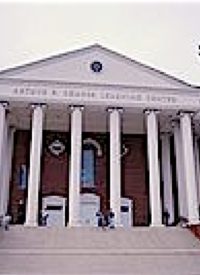
Liberty University, the Christian evangelical college founded by the late television pastor and pro-family spokesman Jerry Falwell as an extension of his Lynchburg, Virginia congregation in 1971, has taken its place as the nation’s eighth largest, four-year university and the largest private four-year, non-profit university in the United States, the school announced in a press release on March 28.
The designation came from the most recent data released by the U.S. Department of Education’s National Center for Education Statistics. The university exploded from its ranking as the 25th largest liberal arts school to number eight in just one year, largely on the dramatic growth of its online academic program.
According to VirginiaBusiness.com, “Liberty currently has 64,610 students, making it the largest four-year college in Virginia. Liberty University Online accounted for 54,278 of those students. George Mason University, the second-largest college in Virginia, has 39,977 students.”
Liberty announced that it recently sold $120 million in bonds to fund a “substantial increase” in its physical facilities, and has also expanded its online curriculum to include bilingual programs for a growing population of Hispanic students.
“The dramatic increase in our size signifies that students are interested in an education that is not only academically excellent, but also based in values, integrity, and character,” said Jerry Falwell Jr., son of the founder and the university’s current president.
Falwell recalled that his father’s vision was to found a “world-class Christian university” similar in quality to Birgham Young and Notre Dame universities, “with NCAA Division 1 athletics, academic excellence, and all the programs for students that are found at any major university.” Falwell said it was “thrilling and humbling to see Liberty University fulfilling the original vision in so many areas, including the goals for enrollment, so early in the school’s history.”
The school, which had a residential enrollment of 12,805 students at the end of February 2011, has set a goal of increasing that number to 20,000 in the next decade.
However, some observers have noted that Liberty’s dramatic growth has not come without compromise to its founder’s conservative principles of limited government. In addition to its other distinctions, Liberty has also taken its place as the eighth largest recipient of federal aid to a student body in the nation.
“In the span of a year, Liberty has experienced about a 56 percent spike in federal student aid, from $284 million in 2008-2009 to $445 million in 2009-2010,” reported the Lynchburg News and Advance. That $445 million “included $385.9 million in student loans. The rest came in the form of grants and other student aid like work-study.”
But Robert Ritz, Liberty’s executive director of financial aid, insisted that the university’s reliance on federal dollars does not violate the conservative principles the school supposedly espouses. “These funds are authorized by Congress and Congress is elected by voters,” Ritz told the News and Advance. “I’ve always been in the position where I believe I’m a steward of those federal funds. I’m a steward of tax-payer money.”
Ritz noted that each year there are a small number of Liberty students “that don’t want to use federal funds” because of their conservative values. “We honor that,” he said.
By contrast to Liberty, another conservative, Christian liberal arts school, Hillsdale College in Michigan, has consistently refused to receive any federal subsidies, and since 1984 has not allowed its students to use federal loans or grants, preferring instead to help students pay for their education through contributions made by private benefactors.
Similarly, Grove City College, a Christian liberal arts school in Pennsylvania, explains on its website that it “accepts no federal aid of any kind, including federal student grants and loans, in order to avoid federal regulation and preserve the integrity of its mission….”



